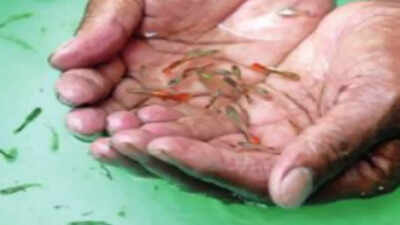Top Searches
- News
- City News
- bengaluru News
- Bengaluru: Larvae-eating fish released in ponds
Bengaluru: Larvae-eating fish released in ponds
Synopsis
Dr Kaulgud said the government is approaching the issue on a war-footing, and has already started raising awareness among people through various programmes.

"These fish eat 300 to 400 larvae," said Dr Kaulgud.
Dr Kaulgud said the government is approaching the issue on a war-footing, and has already started raising awareness among people through various programmes.
It is taking steps to control the larvae population with the help of special fish — guppy and gambusia.
“We have procured these fish from the fisheries department and released them in ponds and waterbodies that cannot be emptied. These fish eat 300 to 400 larvae,” he said.
He also urged people to observe a ‘dry day’ every month, where they empty all containers which have water.
He said the department has distributed insecticidetreated mosquito nets, supplied by the central government, in remote parts of the state.
It is taking steps to control the larvae population with the help of special fish — guppy and gambusia.
TimesView
Rain may have come as a refreshing change from the searing heat, but it has added to the city's dengue burden. What's worrying is that the number is significantly higher than the corresponding period last year. If this is the situation now, what could happen post monsoon, when cases usually peak, is anybody's guess. The authorities must strengthen vectorcontrol strategies like fogging to eliminate mosquito-breeding spaces. Even early detection and better awareness will help contain the spread. Citizens should do their bit by using mosquito repellents and preventing water from stagnating. With the Covid threat still persisting, the state can ill-afford another health crisis.
“We have procured these fish from the fisheries department and released them in ponds and waterbodies that cannot be emptied. These fish eat 300 to 400 larvae,” he said.
He also urged people to observe a ‘dry day’ every month, where they empty all containers which have water.
He said the department has distributed insecticidetreated mosquito nets, supplied by the central government, in remote parts of the state.
FOLLOW US ON SOCIAL MEDIA
FacebookTwitterInstagram
Looking for Something?

Start a Conversation
end of article

